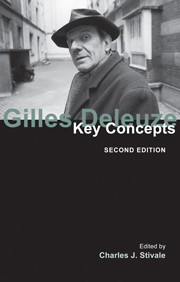Book contents
- Frontmatter
- Contents
- Contributors
- Acknowledgements
- Abbreviations
- Introduction: Gilles Deleuze, a life in friendship
- PART I PHILOSOPHIES
- PART II ENCOUNTERS
- 5 Sense, series
- 6 Event
- 7 Assemblage
- 8 Micropolitics
- 9 Becoming-woman
- 10 The minor
- 11 Style, stutter
- 12 The logic of sensation
- 13 Cinema
- Part III FOLDS
- Chronology
- Bibliography
- Index
6 - Event
from PART II - ENCOUNTERS
- Frontmatter
- Contents
- Contributors
- Acknowledgements
- Abbreviations
- Introduction: Gilles Deleuze, a life in friendship
- PART I PHILOSOPHIES
- PART II ENCOUNTERS
- 5 Sense, series
- 6 Event
- 7 Assemblage
- 8 Micropolitics
- 9 Becoming-woman
- 10 The minor
- 11 Style, stutter
- 12 The logic of sensation
- 13 Cinema
- Part III FOLDS
- Chronology
- Bibliography
- Index
Summary
Everything is event
In one of his last lessons, on 10 March 1987, Gilles Deleuze returned to the concept of the event. His concern with events and with their place in philosophy dated back to Difference and Repetition and The Logic of Sense. A thread therefore links these late-1960s masterworks with the later lectures and with the book they led to: The Fold: Leibniz and the Baroque. The connection is made through Leibniz and the Stoics. It is also made through features of the concept of the event that remain consistent over more than twenty years. In the later lecture, Deleuze adds the name of Alfred North Whitehead to his list of great thinkers of the event. This then leads to the chapter on Whitehead in The Fold (FLD: 76–82).
The lecture is striking because it demonstrates an important quality of Deleuze's thought. The forms of his various practices in writing and speaking reflect their content. His lesson is itself an event, like all of the earlier lessons he was famous for. However, this might be seen as an empty remark, since it could be argued that any lesson is an event. What is special about Deleuze's teaching as event? The answer is at first sight a contradictory one, but it is important because it draws out those features of the event that Deleuze sought to convey in his philosophy.
- Type
- Chapter
- Information
- Gilles DeleuzeKey Concepts, pp. 80 - 90Publisher: Acumen PublishingPrint publication year: 2011



